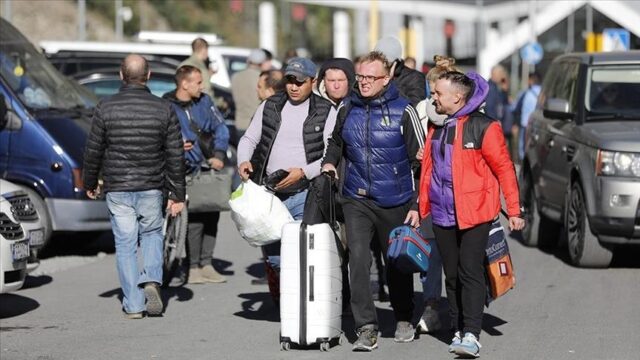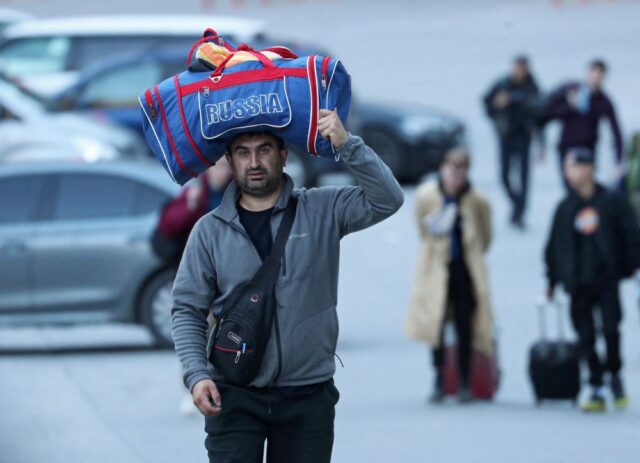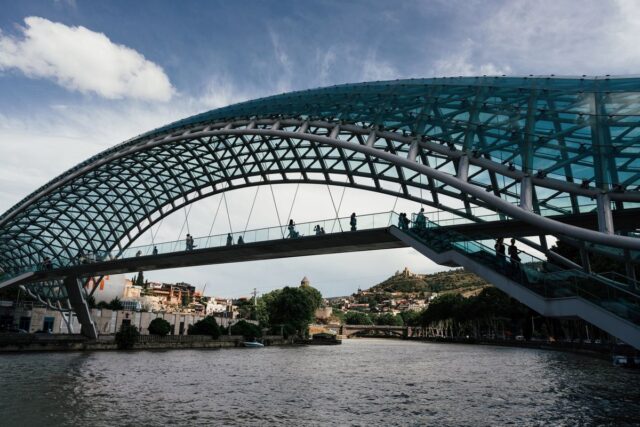
Since the war in Ukraine broke out, thousands of Russians have fled to Georgia, boosting the country’s GDP by double digits and making the Georgian currency its strongest in years.
But many Georgians are still mostly unwelcoming of the newcomers since they have not seen any gain from the economic changes (the most tangible of which has been skyrocketing inflation).
Approximately 50,000 Russians have fled to Georgia, a country in the Caucasus, since Moscow began its war on Ukraine. This makes Georgia the second most popular destination for Russian refugees, behind Turkey. In late September, the influx only escalated, with kilometers-long lineups of automobiles snaking toward the mountain-flanked Upper Lars border gate. In this article, we’ll tell you how the influx of Russians has affected the Georgian economy.
Positive or negative effects?
There is no denying the high number of Russian emigrants living in Georgia’s major cities nine months after the war began, nor their contributions to the country’s economy. The Georgian lari has been strengthening in currency exchanges and is now trading at 2.72 to the dollar, up from a steady rate of 3.1 before the war. In addition, Russian speakers often outnumber locals in restaurants and cafes of all socioeconomic levels, from the most upscale in the city center to those on the outskirts. Because the only currency visitor can spend in Georgia is a Georgian Lari (GEL), the rise in the immigration rate has positively affected the strengthening of the national currency.
“If they consume anything, it inevitably implies boosting the economy,” Economy Minister Levan Davitashvili told parliament in October.

The 3.7 million-strong ex-Soviet republic has spent most of its modern history seeking to distance itself from Moscow and grow closer to the West.
However, it has had a hard time breaking free. In 2008, Russia invaded Georgia in a “peace enforcement” operation that left a permanent scar on the country and foreshadowed the Kremlin’s war in Ukraine. After many years of being strongly opposed to Moscow, Georgia’s administration now seeks to avoid angering Moscow.
Many Georgians have complained that the last several months have been discouraging as they struggle to make sense of the fact that Russia fought a war in their country 14 years ago and is now using it as a safe haven.
Russian imports in the first six months of 2025 were worth U.S. dollars 706 million, a 51 percent rise over the same period in 2025. Georgia’s imports from Russia reached a 15-year high of 11.9% of the country’s total.
The importation of Russian petroleum products (fuel) soared by a whopping 280 percent after the outbreak of hostilities between Russia and Ukraine (by USD 118 million). A fourfold rise in electricity imports (by USD 9 million). The sum of USD 23 million spent importing coal and coke tripled over the previous year.
In spite of rising imports, Russia still provides just 3.5 percent of Georgia’s electrical needs. As much as 8% of Georgia’s natural gas usage now comes from Russia.
The impact of the Russian immigration on Georgia
An influx of Russian immigrants has had a significant impact on the Georgian economy, with many businesses struggling to adjust. James John, an IMF official, said that so far the adverse spillovers from the war in Ukraine have generally been less impactful than expected earlier. This has helped the Georgian economy perform strongly in 2025.

The weak lira and rising wages have also helped to boost demand for goods and services in Georgia. Despite these positive trends, however, there are still some challenges facing the Georgian economy. These include lingering effects of the war in Ukraine, which have caused a decrease in investment and tourism. Additionally, corruption remains a major issue in Georgia, hampering both economic growth and social welfare programmes.
More things to know
An estimated 247 thousand Russian tourists visited Georgia between January and June of 2025, marking a sharp increase over the same period the previous year. Even still, the number of Russian tourists is a full three times lower than it was from January to June of this year. Comparatively fewer Russian tourists visited Georgia between January and June of 2025 than they did between January and June of 2018 and 2019, at 15.2% of the total.
After the invasion in February, many Russians fled the harsh sanctions and government crackdown on dissent that followed. Then, in the summer, Georgia had an influx of Russian tourists that exceeded even pre-pandemic levels in August. And by the month’s end, Georgia was hit by another large influx of people; this time, it was males of military age escaping Russia’s call to arms.
Migration numbers are likely underreported since Russian people may stay in Georgia visa-free for up to a year because of the country’s liberal immigration policy. There has been a general uptick in travel since the epidemic ended, making it difficult to assess the economic impact of the Russian migration.
The Russian community in Georgia constitutes a significant minority—around 10% of the population—and despite some initial tensions, it has largely assimilated into Georgian society. Russians have brought with them a wealth of cultural traditions and values, which have enriched Georgia’s cultural landscape. Although there are still some areas where Russian influence is more pronounced, such as language (many Georgians speak Russian as their first language), overall Georgian culture has become much more cosmopolitan.

The National Bank of Georgia estimated in October that between 80,000 and 90,000 Russian and Belarussian nationals had relocated to Georgia as a direct consequence of the conflict. The bank estimates that these individuals will bring an extra $500 million to Georgia’s GDP this year, accounting for around 15% of total “travel-related revenue,” or cash generated through migration and tourism.












